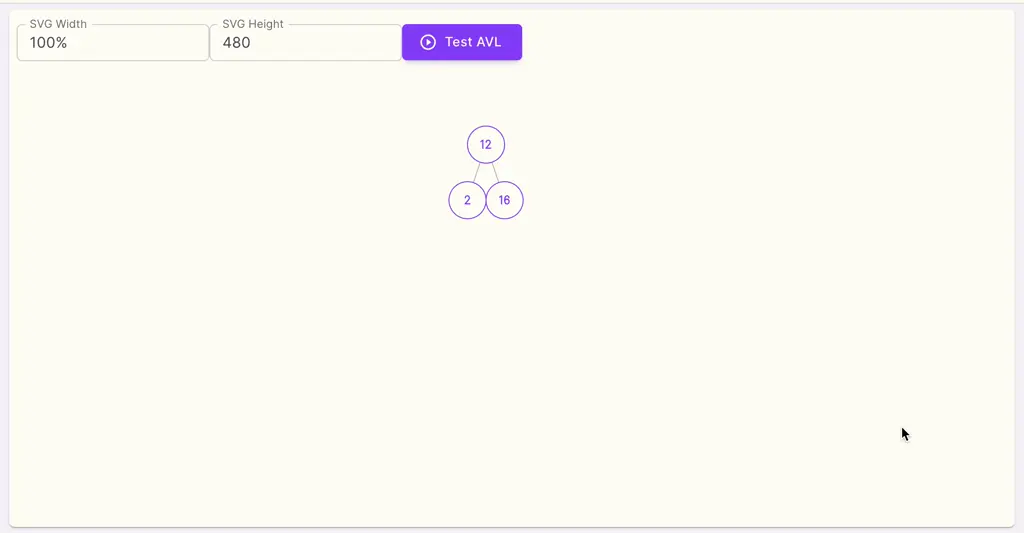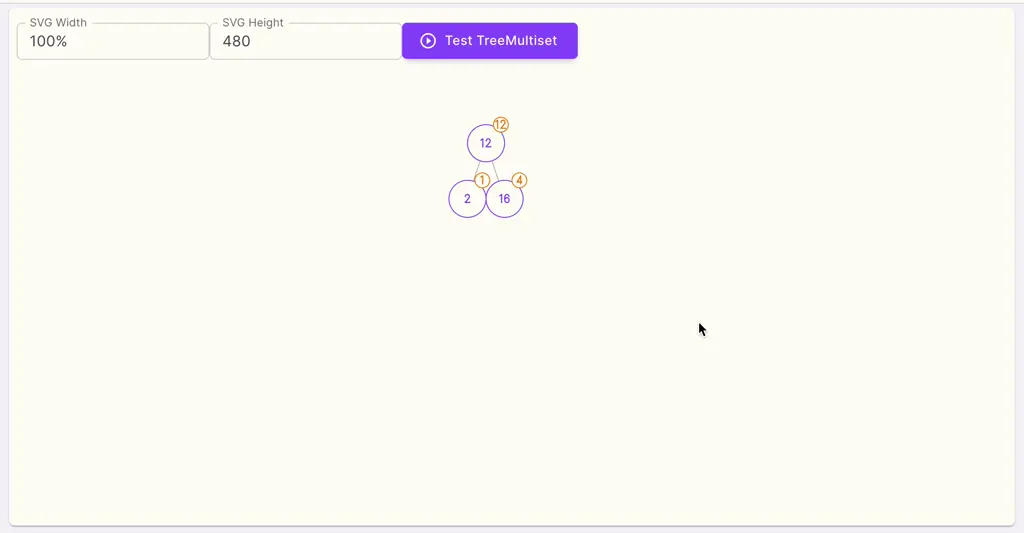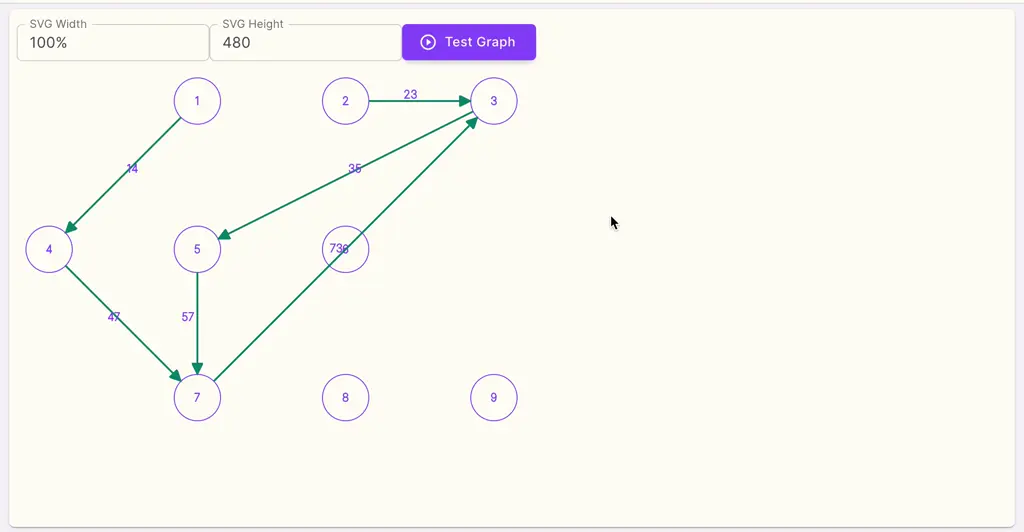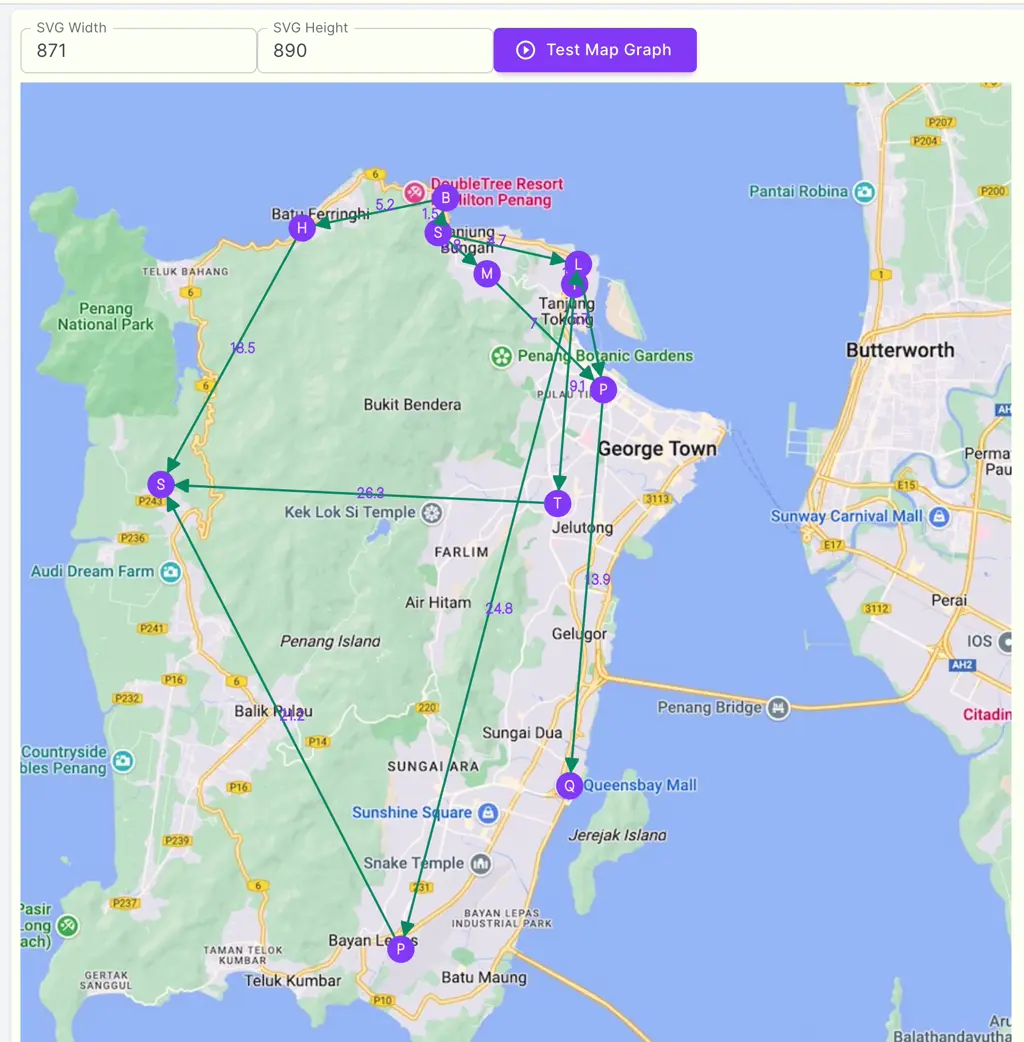
Security News
Fluent Assertions Faces Backlash After Abandoning Open Source Licensing
Fluent Assertions is facing backlash after dropping the Apache license for a commercial model, leaving users blindsided and questioning contributor rights.
@firanorg/a-neque-sunt
Advanced tools
  





npm i data-structure-typed --save
yarn add data-structure-typed
import {
Heap, Graph, Queue, Deque, PriorityQueue, BST, Trie, DoublyLinkedList,
AVLTree, SinglyLinkedList, DirectedGraph, RedBlackTree, TreeMultiMap,
DirectedVertex, Stack, AVLTreeNode
} from 'data-structure-typed';
If you only want to use a specific data structure independently, you can install it separately, for example, by running
npm i heap-typed --save
Do you envy C++ with STL (std::), Python with collections, and Java with java.util ? Well, no need to envy
anymore! JavaScript and TypeScript now have data-structure-typed.Benchmark compared with C++ STL.
API standards aligned with ES6 and Java. Usability is comparable to Python
Performance surpasses that of native JS/TS
| Method | Time Taken | Data Scale | Belongs To | big O |
|---|---|---|---|---|
| Queue.push & shift | 5.83 ms | 100K | Ours | O(1) |
| Array.push & shift | 2829.59 ms | 100K | Native JS | O(n) |
| Deque.unshift & shift | 2.44 ms | 100K | Ours | O(1) |
| Array.unshift & shift | 4750.37 ms | 100K | Native JS | O(n) |
| HashMap.set | 122.51 ms | 1M | Ours | O(1) |
| Map.set | 223.80 ms | 1M | Native JS | O(1) |
| Set.add | 185.06 ms | 1M | Native JS | O(1) |
In java.utils, you need to memorize a table for all sequential data structures(Queue, Deque, LinkedList),
| Java ArrayList | Java Queue | Java ArrayDeque | Java LinkedList |
|---|---|---|---|
| add | offer | push | push |
| remove | poll | removeLast | removeLast |
| remove | poll | removeFirst | removeFirst |
| add(0, element) | offerFirst | unshift | unshift |
whereas in our data-structure-typed, you only need to remember four methods: push, pop, shift, and unshift for all sequential data structures(Queue, Deque, DoublyLinkedList, SinglyLinkedList and Array).
We provide data structures that are not available in JS/TS
| Data Structure | Unit Test | Perf Test | API Doc | NPM | Downloads |
|---|---|---|---|---|---|
| Binary Tree |  |  | Docs | NPM |  |
| Binary Search Tree (BST) |  |  | Docs | NPM |  |
| AVL Tree |  |  | Docs | NPM |  |
| Red Black Tree |  |  | Docs | NPM |  |
| Tree Multimap |  |  | Docs | NPM |  |
| Heap |  |  | Docs | NPM |  |
| Priority Queue |  |  | Docs | NPM |  |
| Max Priority Queue |  |  | Docs | NPM |  |
| Min Priority Queue |  |  | Docs | NPM |  |
| Trie |  |  | Docs | NPM |  |
| Graph |  |  | Docs | NPM |  |
| Directed Graph |  |  | Docs | NPM |  |
| Undirected Graph |  |  | Docs | NPM |  |
| Queue |  |  | Docs | NPM |  |
| Deque |  |  | Docs | NPM |  |
| Hash Map |  |  | Docs | ||
| Linked List |  |  | Docs | NPM |  |
| Singly Linked List |  |  | Docs | NPM |  |
| Doubly Linked List |  |  | Docs | NPM |  |
| Stack |  |  | Docs | NPM |  |
| Segment Tree |  | Docs | |||
| Binary Indexed Tree |  | Docs |
Try it out, or you can run your own code using our visual tool




import { RedBlackTree } from 'data-structure-typed';
const rbTree = new RedBlackTree<number>();
rbTree.addMany([11, 3, 15, 1, 8, 13, 16, 2, 6, 9, 12, 14, 4, 7, 10, 5])
rbTree.isAVLBalanced(); // true
rbTree.delete(10);
rbTree.isAVLBalanced(); // true
rbTree.print()
// ___6________
// / \
// ___4_ ___11________
// / \ / \
// _2_ 5 _8_ ____14__
// / \ / \ / \
// 1 3 7 9 12__ 15__
// \ \
// 13 16
import { RedBlackTree } from 'data-structure-typed';
const rbTree = new RedBlackTree();
rbTree.addMany([11, 3, 15, 1, 8, 13, 16, 2, 6, 9, 12, 14, 4, 7, 10, 5])
rbTree.isAVLBalanced(); // true
rbTree.delete(10);
rbTree.isAVLBalanced(); // true
rbTree.print()
// ___6________
// / \
// ___4_ ___11________
// / \ / \
// _2_ 5 _8_ ____14__
// / \ / \ / \
// 1 3 7 9 12__ 15__
// \ \
// 13 16
const orgArr = [6, 1, 2, 7, 5, 3, 4, 9, 8];
const orgStrArr = ["trie", "trial", "trick", "trip", "tree", "trend", "triangle", "track", "trace", "transmit"];
const entries = [[6, "6"], [1, "1"], [2, "2"], [7, "7"], [5, "5"], [3, "3"], [4, "4"], [9, "9"], [8, "8"]];
const queue = new Queue(orgArr);
queue.print();
// [6, 1, 2, 7, 5, 3, 4, 9, 8]
const deque = new Deque(orgArr);
deque.print();
// [6, 1, 2, 7, 5, 3, 4, 9, 8]
const sList = new SinglyLinkedList(orgArr);
sList.print();
// [6, 1, 2, 7, 5, 3, 4, 9, 8]
const dList = new DoublyLinkedList(orgArr);
dList.print();
// [6, 1, 2, 7, 5, 3, 4, 9, 8]
const stack = new Stack(orgArr);
stack.print();
// [6, 1, 2, 7, 5, 3, 4, 9, 8]
const minHeap = new MinHeap(orgArr);
minHeap.print();
// [1, 5, 2, 7, 6, 3, 4, 9, 8]
const maxPQ = new MaxPriorityQueue(orgArr);
maxPQ.print();
// [9, 8, 4, 7, 5, 2, 3, 1, 6]
const biTree = new BinaryTree(entries);
biTree.print();
// ___6___
// / \
// ___1_ _2_
// / \ / \
// _7_ 5 3 4
// / \
// 9 8
const bst = new BST(entries);
bst.print();
// _____5___
// / \
// _2_ _7_
// / \ / \
// 1 3_ 6 8_
// \ \
// 4 9
const rbTree = new RedBlackTree(entries);
rbTree.print();
// ___4___
// / \
// _2_ _6___
// / \ / \
// 1 3 5 _8_
// / \
// 7 9
const avl = new AVLTree(entries);
avl.print();
// ___4___
// / \
// _2_ _6___
// / \ / \
// 1 3 5 _8_
// / \
// 7 9
const treeMulti = new TreeMultiMap(entries);
treeMulti.print();
// ___4___
// / \
// _2_ _6___
// / \ / \
// 1 3 5 _8_
// / \
// 7 9
const hm = new HashMap(entries);
hm.print()
// [[6, "6"], [1, "1"], [2, "2"], [7, "7"], [5, "5"], [3, "3"], [4, "4"], [9, "9"], [8, "8"]]
const rbTreeH = new RedBlackTree(hm);
rbTreeH.print();
// ___4___
// / \
// _2_ _6___
// / \ / \
// 1 3 5 _8_
// / \
// 7 9
const pq = new MinPriorityQueue(orgArr);
pq.print();
// [1, 5, 2, 7, 6, 3, 4, 9, 8]
const bst1 = new BST(pq);
bst1.print();
// _____5___
// / \
// _2_ _7_
// / \ / \
// 1 3_ 6 8_
// \ \
// 4 9
const dq1 = new Deque(orgArr);
dq1.print();
// [6, 1, 2, 7, 5, 3, 4, 9, 8]
const rbTree1 = new RedBlackTree(dq1);
rbTree1.print();
// _____5___
// / \
// _2___ _7___
// / \ / \
// 1 _4 6 _9
// / /
// 3 8
const trie2 = new Trie(orgStrArr);
trie2.print();
// ['trie', 'trial', 'triangle', 'trick', 'trip', 'tree', 'trend', 'track', 'trace', 'transmit']
const heap2 = new Heap(trie2, { comparator: (a, b) => Number(a) - Number(b) });
heap2.print();
// ['transmit', 'trace', 'tree', 'trend', 'track', 'trial', 'trip', 'trie', 'trick', 'triangle']
const dq2 = new Deque(heap2);
dq2.print();
// ['transmit', 'trace', 'tree', 'trend', 'track', 'trial', 'trip', 'trie', 'trick', 'triangle']
const entries2 = dq2.map((el, i) => [i, el]);
const avl2 = new AVLTree(entries2);
avl2.print();
// ___3_______
// / \
// _1_ ___7_
// / \ / \
// 0 2 _5_ 8_
// / \ \
// 4 6 9
import { BST, BSTNode } from 'data-structure-typed';
const bst = new BST<number>();
bst.add(11);
bst.add(3);
bst.addMany([15, 1, 8, 13, 16, 2, 6, 9, 12, 14, 4, 7, 10, 5]);
bst.size === 16; // true
bst.has(6); // true
const node6 = bst.getNode(6); // BSTNode
bst.getHeight(6) === 2; // true
bst.getHeight() === 5; // true
bst.getDepth(6) === 3; // true
bst.getLeftMost()?.key === 1; // true
bst.delete(6);
bst.get(6); // undefined
bst.isAVLBalanced(); // true
bst.bfs()[0] === 11; // true
bst.print()
// ______________11_____
// / \
// ___3_______ _13_____
// / \ / \
// 1_ _____8____ 12 _15__
// \ / \ / \
// 2 4_ _10 14 16
// \ /
// 5_ 9
// \
// 7
const objBST = new BST<number, { height: number, age: number }>();
objBST.add(11, { "name": "Pablo", "age": 15 });
objBST.add(3, { "name": "Kirk", "age": 1 });
objBST.addMany([15, 1, 8, 13, 16, 2, 6, 9, 12, 14, 4, 7, 10, 5], [
{ "name": "Alice", "age": 15 },
{ "name": "Bob", "age": 1 },
{ "name": "Charlie", "age": 8 },
{ "name": "David", "age": 13 },
{ "name": "Emma", "age": 16 },
{ "name": "Frank", "age": 2 },
{ "name": "Grace", "age": 6 },
{ "name": "Hannah", "age": 9 },
{ "name": "Isaac", "age": 12 },
{ "name": "Jack", "age": 14 },
{ "name": "Katie", "age": 4 },
{ "name": "Liam", "age": 7 },
{ "name": "Mia", "age": 10 },
{ "name": "Noah", "age": 5 }
]
);
objBST.delete(11);
import { AVLTree } from 'data-structure-typed';
const avlTree = new AVLTree<number>();
avlTree.addMany([11, 3, 15, 1, 8, 13, 16, 2, 6, 9, 12, 14, 4, 7, 10, 5])
avlTree.isAVLBalanced(); // true
avlTree.delete(10);
avlTree.isAVLBalanced(); // true
import { DirectedGraph } from 'data-structure-typed';
const graph = new DirectedGraph<string>();
graph.addVertex('A');
graph.addVertex('B');
graph.hasVertex('A'); // true
graph.hasVertex('B'); // true
graph.hasVertex('C'); // false
graph.addEdge('A', 'B');
graph.hasEdge('A', 'B'); // true
graph.hasEdge('B', 'A'); // false
graph.deleteEdgeSrcToDest('A', 'B');
graph.hasEdge('A', 'B'); // false
graph.addVertex('C');
graph.addEdge('A', 'B');
graph.addEdge('B', 'C');
const topologicalOrderKeys = graph.topologicalSort(); // ['A', 'B', 'C']
import { UndirectedGraph } from 'data-structure-typed';
const graph = new UndirectedGraph<string>();
graph.addVertex('A');
graph.addVertex('B');
graph.addVertex('C');
graph.addVertex('D');
graph.deleteVertex('C');
graph.addEdge('A', 'B');
graph.addEdge('B', 'D');
const dijkstraResult = graph.dijkstra('A');
Array.from(dijkstraResult?.seen ?? []).map(vertex => vertex.key) // ['A', 'B', 'D']
MacBook Pro (15-inch, 2018)
Processor 2.2 GHz 6-Core Intel Core i7
Memory 16 GB 2400 MHz DDR4
Graphics Radeon Pro 555X 4 GB
Intel UHD Graphics 630 1536 MB
macOS Big Sur
Version 11.7.9
| test name | time taken (ms) | executions per sec | sample deviation |
|---|---|---|---|
| 100,000 add | 6.09 | 164.12 | 1.35e-4 |
| 100,000 add & poll | 34.55 | 28.94 | 6.43e-4 |
| test name | time taken (ms) | executions per sec | sample deviation |
|---|---|---|---|
| 100,000 add | 76.73 | 13.03 | 0.00 |
| 100,000 add randomly | 80.67 | 12.40 | 0.00 |
| 100,000 get | 110.86 | 9.02 | 0.00 |
| 100,000 iterator | 24.99 | 40.02 | 0.00 |
| 100,000 add & delete orderly | 152.66 | 6.55 | 0.00 |
| 100,000 add & delete randomly | 230.75 | 4.33 | 0.00 |
| test name | time taken (ms) | executions per sec | sample deviation |
|---|---|---|---|
| 1,000,000 push | 39.27 | 25.46 | 0.01 |
| 100,000 push & shift | 4.53 | 220.81 | 4.84e-4 |
| Native JS Array 100,000 push & shift | 1948.05 | 0.51 | 0.02 |
| test name | time taken (ms) | executions per sec | sample deviation |
|---|---|---|---|
| 1,000,000 push | 23.22 | 43.06 | 0.00 |
| 1,000,000 push & pop | 29.68 | 33.69 | 0.00 |
| 1,000,000 push & shift | 29.33 | 34.09 | 0.00 |
| 100,000 push & shift | 3.10 | 323.01 | 2.47e-4 |
| Native JS Array 100,000 push & shift | 1942.12 | 0.51 | 0.02 |
| 100,000 unshift & shift | 2.77 | 360.50 | 2.43e-4 |
| Native JS Array 100,000 unshift & shift | 3835.21 | 0.26 | 0.03 |
| test name | time taken (ms) | executions per sec | sample deviation |
|---|---|---|---|
| 1,000,000 set | 112.38 | 8.90 | 0.02 |
| Native JS Map 1,000,000 set | 199.97 | 5.00 | 0.01 |
| Native JS Set 1,000,000 add | 163.34 | 6.12 | 0.01 |
| 1,000,000 set & get | 109.86 | 9.10 | 0.02 |
| Native JS Map 1,000,000 set & get | 255.33 | 3.92 | 0.00 |
| Native JS Set 1,000,000 add & has | 163.91 | 6.10 | 0.00 |
| 1,000,000 ObjKey set & get | 317.89 | 3.15 | 0.04 |
| Native JS Map 1,000,000 ObjKey set & get | 282.99 | 3.53 | 0.03 |
| Native JS Set 1,000,000 ObjKey add & has | 253.93 | 3.94 | 0.03 |
| test name | time taken (ms) | executions per sec | sample deviation |
|---|---|---|---|
| 100,000 push | 43.71 | 22.88 | 7.33e-4 |
| 100,000 getWords | 83.63 | 11.96 | 0.00 |
| test name | time taken (ms) | executions per sec | sample deviation |
|---|---|---|---|
| 100,000 add | 271.93 | 3.68 | 0.01 |
| 100,000 add randomly | 318.27 | 3.14 | 0.00 |
| 100,000 get | 128.85 | 7.76 | 0.00 |
| 100,000 iterator | 29.09 | 34.38 | 0.00 |
| 100,000 add & delete orderly | 435.48 | 2.30 | 7.44e-4 |
| 100,000 add & delete randomly | 578.70 | 1.73 | 0.00 |
| test name | time taken (ms) | executions per sec | sample deviation |
|---|---|---|---|
| 10,000 RBTree add randomly | 6.69 | 149.54 | 1.06e-4 |
| 10,000 RBTree get randomly | 9.19 | 108.82 | 1.43e-4 |
| 10,000 RBTree add & delete randomly | 18.54 | 53.94 | 1.73e-4 |
| 10,000 AVLTree add randomly | 23.70 | 42.20 | 1.88e-4 |
| 10,000 AVLTree get randomly | 9.89 | 101.11 | 0.00 |
| 10,000 AVLTree add & delete randomly | 44.44 | 22.50 | 4.30e-4 |
| test name | time taken (ms) | executions per sec | sample deviation |
|---|---|---|---|
| 1,000 addVertex | 0.10 | 9766.65 | 9.83e-7 |
| 1,000 addEdge | 6.15 | 162.57 | 7.99e-4 |
| 1,000 getVertex | 0.05 | 2.18e+4 | 4.52e-7 |
| 1,000 getEdge | 22.70 | 44.06 | 0.00 |
| tarjan | 203.00 | 4.93 | 0.01 |
| topologicalSort | 176.40 | 5.67 | 0.00 |
| test name | time taken (ms) | executions per sec | sample deviation |
|---|---|---|---|
| 1,000,000 push | 222.02 | 4.50 | 0.07 |
| 1,000,000 unshift | 220.41 | 4.54 | 0.05 |
| 1,000,000 unshift & shift | 185.31 | 5.40 | 0.01 |
| 1,000,000 addBefore | 317.20 | 3.15 | 0.07 |
| test name | time taken (ms) | executions per sec | sample deviation |
|---|---|---|---|
| 1,000,000 push & shift | 204.82 | 4.88 | 0.09 |
| 10,000 push & pop | 221.88 | 4.51 | 0.03 |
| 10,000 addBefore | 247.28 | 4.04 | 0.01 |
| test name | time taken (ms) | executions per sec | sample deviation |
|---|---|---|---|
| 100,000 add | 26.97 | 37.08 | 7.97e-4 |
| 100,000 add & poll | 74.55 | 13.41 | 5.19e-4 |
| test name | time taken (ms) | executions per sec | sample deviation |
|---|---|---|---|
| 1,000,000 push | 35.54 | 28.14 | 0.00 |
| 1,000,000 push & pop | 44.89 | 22.27 | 0.01 |
| Data Structure Typed | C++ STL | java.util | Python collections |
|---|---|---|---|
| Heap<E> | - | - | heapq |
| PriorityQueue<E> | priority_queue<T> | PriorityQueue<E> | - |
| Deque<E> | deque<T> | ArrayDeque<E> | deque |
| Queue<E> | queue<T> | Queue<E> | - |
| HashMap<K, V> | unordered_map<K, V> | HashMap<K, V> | defaultdict |
| DoublyLinkedList<E> | list<T> | LinkedList<E> | - |
| SinglyLinkedList<E> | - | - | - |
| BinaryTree<K, V> | - | - | - |
| BST<K, V> | - | - | - |
| RedBlackTree<E> | set<T> | TreeSet<E> | - |
| RedBlackTree<K, V> | map<K, V> | TreeMap<K, V> | - |
| TreeMultiMap<K, V> | multimap<K, V> | - | - |
| TreeMultiMap<E> | multiset<T> | - | - |
| Trie | - | - | - |
| DirectedGraph<V, E> | - | - | - |
| UndirectedGraph<V, E> | - | - | - |
| PriorityQueue<E> | priority_queue<T> | PriorityQueue<E> | - |
| Array<E> | vector<T> | ArrayList<E> | list |
| Stack<E> | stack<T> | Stack<E> | - |
| HashMap<E> | unordered_set<T> | HashSet<E> | set |
| - | unordered_multiset | - | Counter |
| LinkedHashMap<K, V> | - | LinkedHashMap<K, V> | OrderedDict |
| - | unordered_multimap<K, V> | - | - |
| - | bitset<N> | - | - |
| Algorithm | Function Description | Iteration Type |
|---|---|---|
| Binary Tree DFS | Traverse a binary tree in a depth-first manner, starting from the root node, first visiting the left subtree, and then the right subtree, using recursion. | Recursion + Iteration |
| Binary Tree BFS | Traverse a binary tree in a breadth-first manner, starting from the root node, visiting nodes level by level from left to right. | Iteration |
| Graph DFS | Traverse a graph in a depth-first manner, starting from a given node, exploring along one path as deeply as possible, and backtracking to explore other paths. Used for finding connected components, paths, etc. | Recursion + Iteration |
| Binary Tree Morris | Morris traversal is an in-order traversal algorithm for binary trees with O(1) space complexity. It allows tree traversal without additional stack or recursion. | Iteration |
| Graph BFS | Traverse a graph in a breadth-first manner, starting from a given node, first visiting nodes directly connected to the starting node, and then expanding level by level. Used for finding shortest paths, etc. | Recursion + Iteration |
| Graph Tarjan's Algorithm | Find strongly connected components in a graph, typically implemented using depth-first search. | Recursion |
| Graph Bellman-Ford Algorithm | Finding the shortest paths from a single source, can handle negative weight edges | Iteration |
| Graph Dijkstra's Algorithm | Finding the shortest paths from a single source, cannot handle negative weight edges | Iteration |
| Graph Floyd-Warshall Algorithm | Finding the shortest paths between all pairs of nodes | Iteration |
| Graph getCycles | Find all cycles in a graph or detect the presence of cycles. | Recursion |
| Graph getCutVertices | Find cut vertices in a graph, which are nodes that, when removed, increase the number of connected components in the graph. | Recursion |
| Graph getSCCs | Find strongly connected components in a graph, which are subgraphs where any two nodes can reach each other. | Recursion |
| Graph getBridges | Find bridges in a graph, which are edges that, when removed, increase the number of connected components in the graph. | Recursion |
| Graph topologicalSort | Perform topological sorting on a directed acyclic graph (DAG) to find a linear order of nodes such that all directed edges go from earlier nodes to later nodes. | Recursion |
We strictly adhere to computer science theory and software development standards. Our LinkedList is designed in the traditional sense of the LinkedList data structure, and we refrain from substituting it with a Deque solely for the purpose of showcasing performance test data. However, we have also implemented a Deque based on a dynamic array concurrently.
| Principle | Description |
|---|---|
| Practicality | Follows ES6 and ESNext standards, offering unified and considerate optional parameters, and simplifies method names. |
| Extensibility | Adheres to OOP (Object-Oriented Programming) principles, allowing inheritance for all data structures. |
| Modularization | Includes data structure modularization and independent NPM packages. |
| Efficiency | All methods provide time and space complexity, comparable to native JS performance. |
| Maintainability | Follows open-source community development standards, complete documentation, continuous integration, and adheres to TDD (Test-Driven Development) patterns. |
| Testability | Automated and customized unit testing, performance testing, and integration testing. |
| Portability | Plans for porting to Java, Python, and C++, currently achieved to 80%. |
| Reusability | Fully decoupled, minimized side effects, and adheres to OOP. |
| Security | Carefully designed security for member variables and methods. Read-write separation. Data structure software does not need to consider other security aspects. |
| Scalability | Data structure software does not involve load issues. |
Now you can use it in Node.js and browser environments
CommonJS:require export.modules =
ESModule: import export
Typescript: import export
UMD: var Deque = dataStructureTyped.Deque
Copy the line below into the head tag in an HTML document.
<script src='https://cdn.jsdelivr.net/npm/data-structure-typed/dist/umd/data-structure-typed.js'></script>
<script src='https://cdn.jsdelivr.net/npm/data-structure-typed/dist/umd/data-structure-typed.min.js'></script>
Copy the code below into the script tag of your HTML, and you're good to go with your development.
const { Heap } = dataStructureTyped;
const {
BinaryTree, Graph, Queue, Stack, PriorityQueue, BST, Trie, DoublyLinkedList,
AVLTree, MinHeap, SinglyLinkedList, DirectedGraph, TreeMultiMap,
DirectedVertex, AVLTreeNode
} = dataStructureTyped;
FAQs
  
Socket for GitHub automatically highlights issues in each pull request and monitors the health of all your open source dependencies. Discover the contents of your packages and block harmful activity before you install or update your dependencies.

Security News
Fluent Assertions is facing backlash after dropping the Apache license for a commercial model, leaving users blindsided and questioning contributor rights.

Research
Security News
Socket researchers uncover the risks of a malicious Python package targeting Discord developers.

Security News
The UK is proposing a bold ban on ransomware payments by public entities to disrupt cybercrime, protect critical services, and lead global cybersecurity efforts.